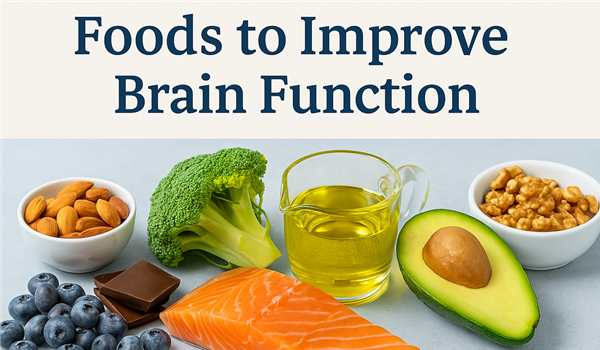Foods for brain health nutrition

Patient Information Leaflet: Foods That Support Brain Health
Kensington Medical Centre – Belfast
⸻
Why Brain Health Matters
Your brain controls how you think, feel, move, and remember. Eating the right foods can help keep your brain healthy as you age, improve focus, and support mood and memory.
⸻
What Helps the Brain Work Well?
A healthy brain needs:
• Good blood flow
• Healthy fats
• Antioxidants
• Vitamins and minerals
• Enough energy from food
⸻
Top Foods That Support Brain Function
1. Oily Fish
Rich in omega-3 fatty acids, which help build brain cells and improve memory.
Examples: salmon, mackerel, anchovies, sardines, herring
These fish are high in healthy fats and typically lower in mercury than larger fish, making them excellent choices for regular consumption.
2. Leafy Green Vegetables
Full of vitamin K, folate, and antioxidants that may slow brain ageing.
Examples: spinach, kale, broccoli, cabbage
3. Berries
Contain antioxidants that protect brain cells and may help improve memory.
Examples: blueberries, strawberries, blackberries
4. Eggs
Contain choline, a nutrient important for memory and learning. Also a good source of B vitamins.
5. Wholegrains
Provide slow-releasing energy to keep you focused throughout the day.
Examples: oats, brown rice, wholegrain bread and pasta
6. Nuts and Seeds
Good source of vitamin E and healthy fats, which may help prevent cognitive decline.
Examples: walnuts, almonds, flaxseeds, chia seeds
7. Avocados
Packed with healthy fats that support blood flow and brain function.
8. Dark Chocolate
Contains flavonoids and caffeine that may improve alertness and memory (enjoy in moderation).
9. Beans and Lentils
Provide steady energy and are rich in folate, which helps with brain development and mental function.
10. Water
Staying hydrated is key for concentration and mental clarity.
⸻
Helpful Tips for Brain Health
• Eat a balanced diet with a variety of colourful fruits and vegetables
• Include oily fish 1–2 times per week
• Limit sugary and highly processed foods
• Stay active and get regular exercise
• Keep your brain engaged with reading, puzzles, or learning
• Sleep well and manage stress
⸻
When to See a Doctor
Talk to your GP if you:
• Notice ongoing memory problems or confusion
• Feel unusually tired, anxious, or low in mood
• Have concerns about your diet or nutrition
• Have a medical condition that may affect brain health
Your doctor can help with tests or referrals if needed.
⸻
For more information, visit www.nhs.uk/live-well/eat-well
This leaflet is for general information only. Please speak to your healthcare provider for advice specific to you.
Medical Disclaimer
The dietary advice and information provided in this leaflet are for general guidance and educational purposes only. They are not intended to replace personalised advice, diagnosis, or treatment from a qualified healthcare professional.
If you have a medical condition, are taking medication, are pregnant or breastfeeding, or have specific dietary needs or food allergies, you should consult your GP, dietitian, or another healthcare provider before making significant changes to your diet.
Following general dietary recommendations without proper medical supervision may not be suitable for everyone and could result in unintended health effects. Always seek individualised medical advice for your personal health circumstances.
Page created: 01 June 2025